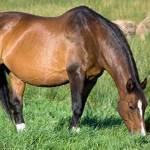Pros and Cons: Feeding Concentrates Late in a Mare’s Pregnancy

Many pregnant broodmares have similar energy requirements as mature, idle horses and thrive on hay-based diets. Nonetheless, mares late in pregnancy are frequently offered additional energy in the form of concentrated feeds, such as those containing oats, soybean, barley, corn, beet pulp, stabilized rice bran, and other feedstuffs.
“Two-thirds of a foal’s growth occurs during the last few months of gestation, which requires a large amount of energy from the mare. She also needs additional energy after foaling to produce the milk that will support the foal until weaning,” said Kathleen Crandell, Ph.D., a nutritionist with Kentucky Equine Research.
The goal of providing extra calories by supplementing with concentrates from around the start of the seventh month until weaning will ensure certain mares do not become too thin. Underweight mares, although typically still able to produce sufficient volumes of milk for their foals, lose excessive weight, have reduced fertility, and can have altered colostrum and milk content and quality.
“Ideally, mares should have a body condition score (BCS) of 6 (on the nine-point Henneke scale) immediately prior to parturition, especially if you are planning on breeding her back right away, like on her foal heat,” recommended Crandell. Mares with a BCS higher than 7 also have health risks. For example, overweight mares are thought to have an increased risk of dystocia, reduced sensitivity to insulin, and decreased colostrum quality.
In turn, foals produced by overweight mares might also suffer adverse health effects. As highlighted in a recent study on pregnant mare nutrition*, foals born from mares supplemented with barley during late pregnancy and kept in a high body condition were born with a slightly decreased sensitivity to insulin and a possible increased risk of osteochondrosis, a developmental orthopedic disease. Those changes “vanished at weaning” and no difference in insulin sensitivity or osteochondrosis existed between foals from mares fed barley and those fed only forage.
Clearly, feeding pregnant mares is not formulaic: not all broodmares require additional concentrates. If in doubt about your pregnant mare’s BCS and diet, consult your veterinarian or equine nutritionist.
*Peugnet, P., M. Robles, L. Mendoza, et al. 2015. Effects of moderate amounts of barley in late pregnancy on growth, glucose metabolism and osteoarticular status of pre-weaning horses. PLoS One. 10(4):e0122596.








